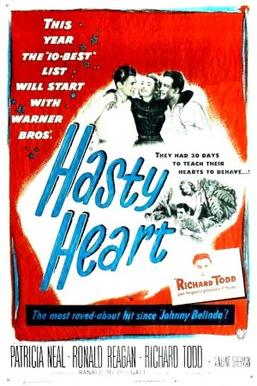Serving in Burma in WWII with his Scottish regiment, Corporal Lachlan MacLachlan (Richard Todd) is wounded while on patrol and sent to a military hospital in the jungle. Shrapnel has torn up his kidney forcing doctors to remove it, but now his second kidney is showing signs of failure. Doctors only give him a few weeks to live but decide not to tell him. Instead, he's moved to another ward, this one run by Nurse Margaret Parker (Patricia Neal) with five international patients, soldiers from around the world, including Yank (Ronald Reagan). The ward is asked to be kind and friendly to Lachlan, hopefully making the most of his last few weeks alive. Not knowing why his orders home are being held up, Lachlan isn't going to make it easy.
Based off a play from writer John Patrick, 'Hasty' is a great example of a play making the successful jump to film effortlessly. With a few quick departures outdoors, the entire movie -- at 102 minutes -- is set in the one ward occupied by Nurse Parker, Yank and four other recovering soldiers. It's easy to see this being a stage-based play. The story is a good one no matter whether it is a play or a film. Director Vincent Sherman personalizes the story as much as possible, bringing to life all the different characters and seeing their predicament. A little sappy, a little too sentimental at times maybe, but this isn't a cynical, world-weary look at the closing days and subsequent months following WWII. It is instead a story of the people involved, and the effect the war has had on them.
Earning a Best Actor nomination for the 1949 Oscars was an achievement in itself for actor Richard Todd, the only nomination he would get in an underrated career. Other performances from that year? Broderick Crawford in All the King's Men, Kirk Douglas in Champion, John Wayne in Sands of Iwo Jima, and Gregory Peck in Twelve O'Clock High. Not bad, huh? In just his third credited role as an actor, Todd leaves his mark. His Lachie comes from a tough background where he's always dealt with ridicule and scorn, fighting for everything he's earned. When these other patients warm up to him -- despite everything he throws at them -- he's thrown for a loop. It is a beautiful performance, especially when he does open up to his fellow prisoners. Todd makes this character human where it wasn't human just minutes before. He didn't win the Oscar, losing to Crawford's much showier part, but it is a well deserved nomination.
What struck me as odd with the nomination is that Todd received third billing behind both Reagan and Neal in the cast. It is a leading performance, but one of three 'Hasty' offers. Any one of the three offers a performance that could carry a movie on its own. The future 40th President of the United States, Reagan takes his chance to act here and runs with it. He was in a lot of B-movies that didn't always offer him a chance to act. He was just himself, but his part as Yank, an American soldier recovering from a bout with malaria, the unofficial leader of the ward is a solid one and layered. Like the other patients, he's genuinely trying to befriend Lachie only to meet roadblock after roadblock. Neal is Neal, easily one of the most underrated actresses of her generation. Her Nurse Parker is the epitome of what a nurse should be. She's thoughtful, caring and willing to work at helping her patients even when they want nothing to do with her.
The other patients are an international group that reflect the wide-ranging melting pot that were the soldiers fighting in Burma in 1944 and 1945. The group includes Tommy (Howard Marion-Crawford), an overweight Brit who jokes about his weight, Kiwi (Ralph Michael), a New Zealander who wants to get home and see his newborn baby, Digger (John Sherman), the quiet Aussie, and Blossom (Orlando Martins), the African soldier who can't understand a word of English. I liked the dynamic among the group. It reflects a group that's been with each other for awhile now, friendships quickly forming in a trying situation. Anthony Nicholls plays Lt. Colonel Dunn, the commander of the hospital who makes the decision to not tell MacLachlan the news.
I wasn't sure how they were going to wrap up 'Hasty' with several options available. Do you show Lachie's death? Do you hold back and leave it up to us as an audience to imagine it? Or the worst option, do you swoop in at the end and save him, offering a kidney transplant? On that subject, the movie says it can't be done, but I thought you could transplant a kidney. Eh, what do I know, I'm writing movie reviews. The important point is that Sherman chooses the right option...whatever that might be. Sorry, no spoilers. It's a fitting, very moving ending, especially a simple gesture Reagan's Yank makes to the Scotsman. A great movie on the whole.
The Hasty Heart <---TCM clips (1949): ****/****


No comments:
Post a Comment